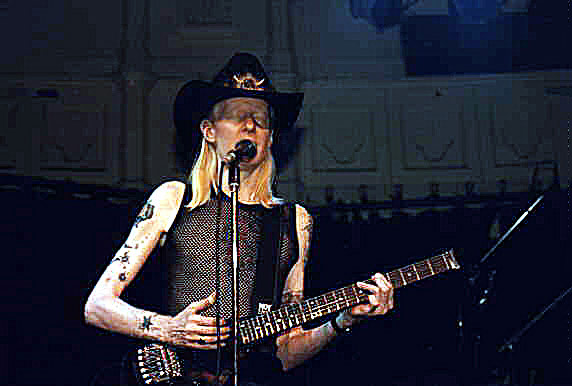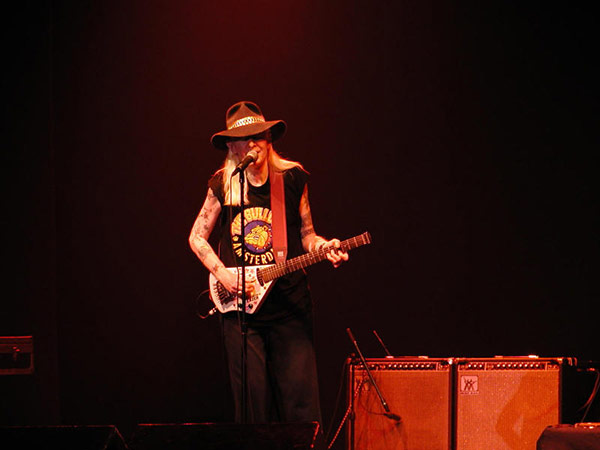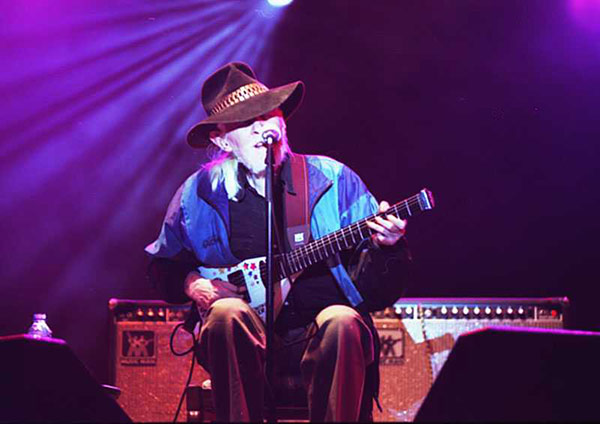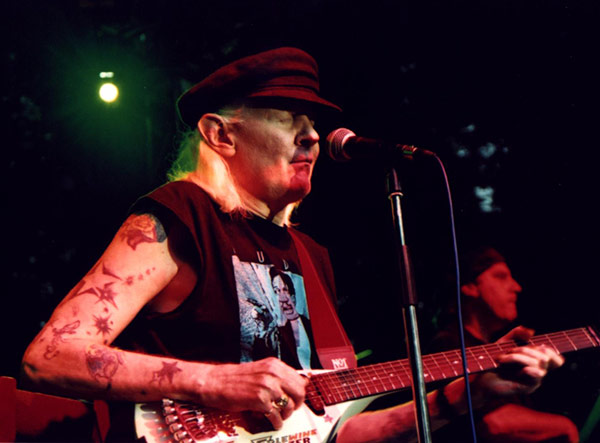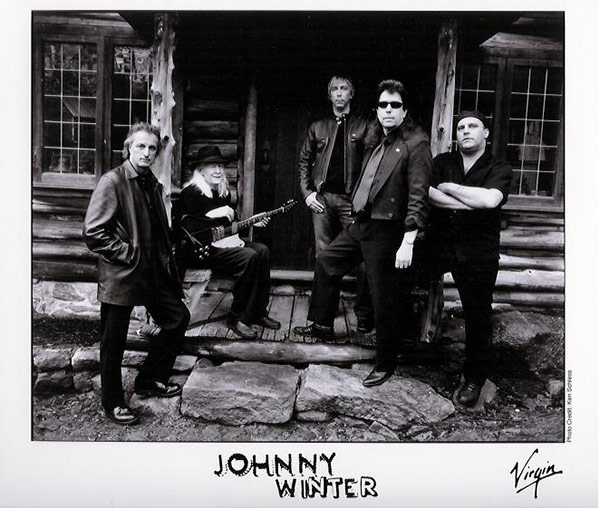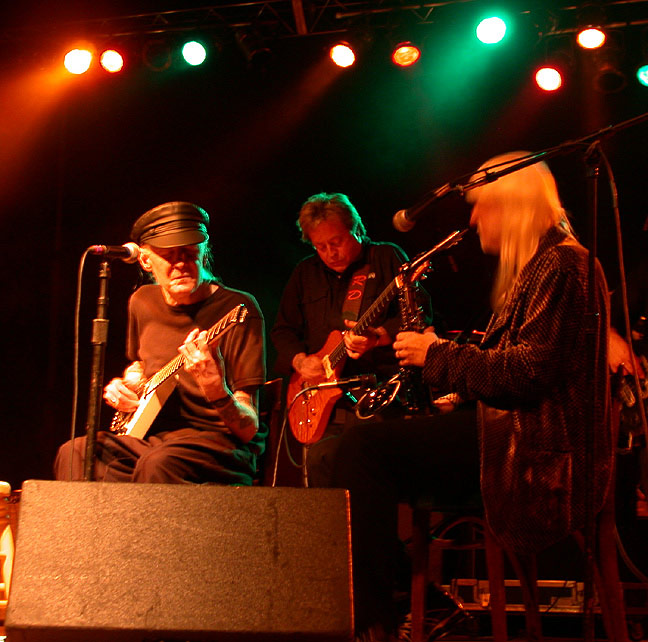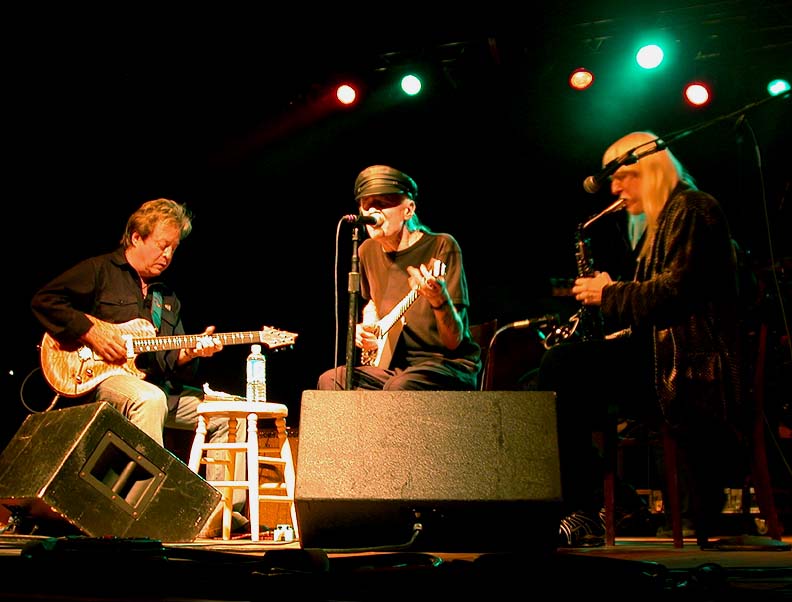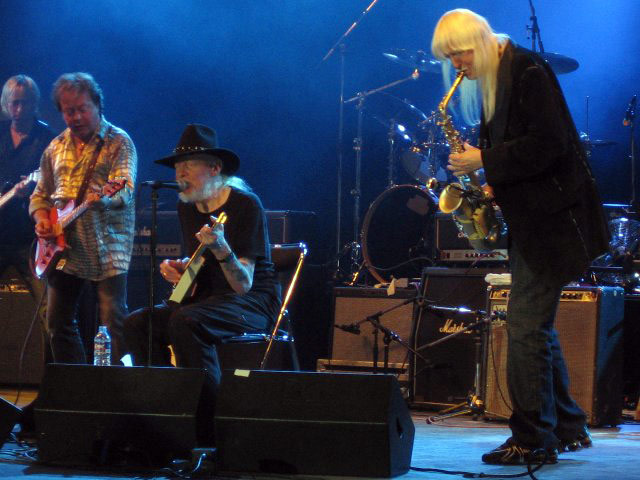Johnny Winter is considered by many to be one of the greatest blues-rock artists of all time. His musical career began at the age of fourteen, when he and his keyboard-playing brother Edgar formed Johnny and the Jammers in their hometown of Beaumont, Texas. Since then, Johnny has crafted his own music and reinterpreted others' blues standards and rock classics, including B.B. King's "Rock Me Baby," Chuck Berry's "Johnny B. Goode," and Bob Dylan's "Highway 61 Revisited." His latest release, The Best of Johnny Winter, is now available on Sony/Legacy. Talk to Johnny Winter about music, past and present.
Ontario, California:
Johnny, who are you listening to these days?
Johnny Winter: I like to listen to old records I grew up with, like Muddy Waters.
Philadelphia, Pennsylvania:
Hi Johnny, I am a longtime fan of yours and am curious as to which drummer and bass player you have enjoyed playing with throughout your career? I really liked the years with Jon Paris and Tom Compton. Thank you for your time.
Johnny Winter: Tom Compton is probably my favorite.
Brooklyn, NY:
Dear Johnny, your recent live shows and recordings have all consisted entirely of blues. Don’t get me wrong — I love your blues music — but I also used to enjoy hearing you play some good ol' rock and roll. Will you ever play rock music again? Thanks, Steve.
Johnny Winter: I probably will do a little bit of it, but I like the blues the best.
Niagara Falls, Ont., Canada:
Thanks for over 30 years of the greatest live shows and the most incredible blues. I have always been told you purchased your 1958 Flying V in Montreal, Canada. I know you do not play it in concert anymore, however, is that where it was bought, and do you still own it? Have a great 2002.
Johnny Winter: No, it was stolen from me, but I don’t remember where it happened. I’m not sure whether I bought it in Montreal—it was too long ago!
Minneapolis, MN:
If you could change anything about your career, what would it be? Or wouldn’t you change anything?
Johnny Winter: I don’t think I’d change anything.
England:
Have you or Edgar ever considered writing a biography of your experiences and musical career?
Johnny Winter: We’ve talked about it a lot; it just hasn’t been the right time or the right person to do it with. I hope I do someday.
Mesa, Arizona:
Thanks for so many years of cranking out the music. Your music still gets plenty of airtime in this house. How is your health, and what is an average day for you? Thanks…Lyle.
Johnny Winter: Average day? I watch a lot of television, practice a couple of times a week, and that’s about it. And I’m feeling fine, thank you.
Carnoustie, Scotland:
You have played with a lot of different musicians in various incarnations of your band. Do you ever see any of the old guys—particularly Rick Derringer—would you record or tour with Rick again?
Johnny Winter: No, I wouldn’t. I prefer playing with one guitar instead of two. And no, I don’t keep in touch with Rick Derringer.
Stevensville, MD:
There is something of a resurgence of slide players these days. Have you heard any that especially impress you as contributing something new and unique? What do you listen to most often when you kick back and relax?
Johnny Winter: No, I don’t listen to a lot of new music, so I’m kind of behind the times on that.
Shelbyville, Indiana:
Are you planning on touring again anytime soon?
Johnny Winter: Yes, I am. I’m going to do my record first, though. I’ll be going into the studio in the next month.
Digby, Nova Scotia:
Any chance of you recording a Lightnin' Hopkins song on the new album?
Johnny Winter: I don’t think so, no.
St. Paul, Minnesota:
Do you ever play the tune “Broke Down Engine” anymore?
Johnny Winter: No, I don’t. It’s an acoustic song, and I don’t play acoustic songs in person.
Moncton, NB:
Hi Johnny. I was wondering if there are going to be any acoustic songs on your upcoming Pointblank release? I would love to hear some new stuff on your old Nationals. Ever think about doing a newer version of your old song “Low Down Gal of Mine”?
Johnny Winter: I probably will do an acoustic song or two on my new record, but I don’t think I’ll be redoing “Low Down Gal of Mine.”
Sacramento, CA:
How was it to work with Gregg Allman? Were you and Duane close?
Johnny Winter: I loved working with Gregg, and Duane too.
Houston, TX:
Why is Beaumont, TX always named as your hometown? What happened to Leland, Mississippi? Do you remember Joe Frank Carolla (nominated for a Grammy years ago for "Don’t Pull Your Love" while part of Hamilton, Joe Frank, and Reynolds)? I also believe Joe Frank drove you to school in Leland on a yellow school bus. I would venture to guess that The Delta has a larger heritage of the blues than Beaumont. Don’t get me wrong, I like Beaumont, but I like Leland better. Let me know your thoughts! Thanks! Price Williams
Johnny Winter: I wasn’t born in Leland, I was born in Beaumont, but my father was in the army at the time, and my mother didn’t want me to be born in Leland where there were no hospitals. And no, Joe Frank Carolla didn’t drive me to school—but I do know who he is.
Stevensville, MD:
Not many people know that you headlined the historic Allman Brothers shows at the Fillmore East in ’71. Was that the first time you had heard Duane’s playing, and was it tough following up such a killer set? (As I recall, your set was also great, by the way).
Johnny Winter: We did do the show, and I just played my normal set and didn’t worry about what Duane was doing.
Delsbo, Sweden: Any plans on recording another "rock album" like Raisin' Cain and the Johnny Winter And projects? I’m a blues fan and you’re one of the greatest in that genre, but I also love your interpretations of Dylan, Womack, etc. That mixture of slide guitar, blues licks, and heavy, melodic rock is much too rare in today’s music, and no one did it better than you!
Johnny Winter: Not really any plans for doing that now.
Halifax, Nova Scotia: You did "The Oakie Dokie Stomp" in concert in the early 90s. Have you ever recorded that song in the studio but never released it? Keep rockin', Bob.
Johnny Winter: No, I’ve never recorded it, and I have no plans to at the moment.
Carnoustie, Scotland: Johnny, I have been a fan since ’71 and would just love to be able to say I had seen you play live just once before I die! You don’t make it very easy though, do you? Any chance of a proper British tour…and I don’t mean a Blues Festival…I mean a TOUR? In the past, you have headed off to mainland Europe and ignored the UK—particularly Scotland!
Johnny Winter: No plans for that right now.
Pittston, Maine:
I’ve seen you several times up here in Maine. Hope you come again. My question is: What guitar are you playing in concert now?
Johnny Winter: It’s called the Laser, and I got it in Austin, Texas. But I still play my Firebird guitar for slide.


